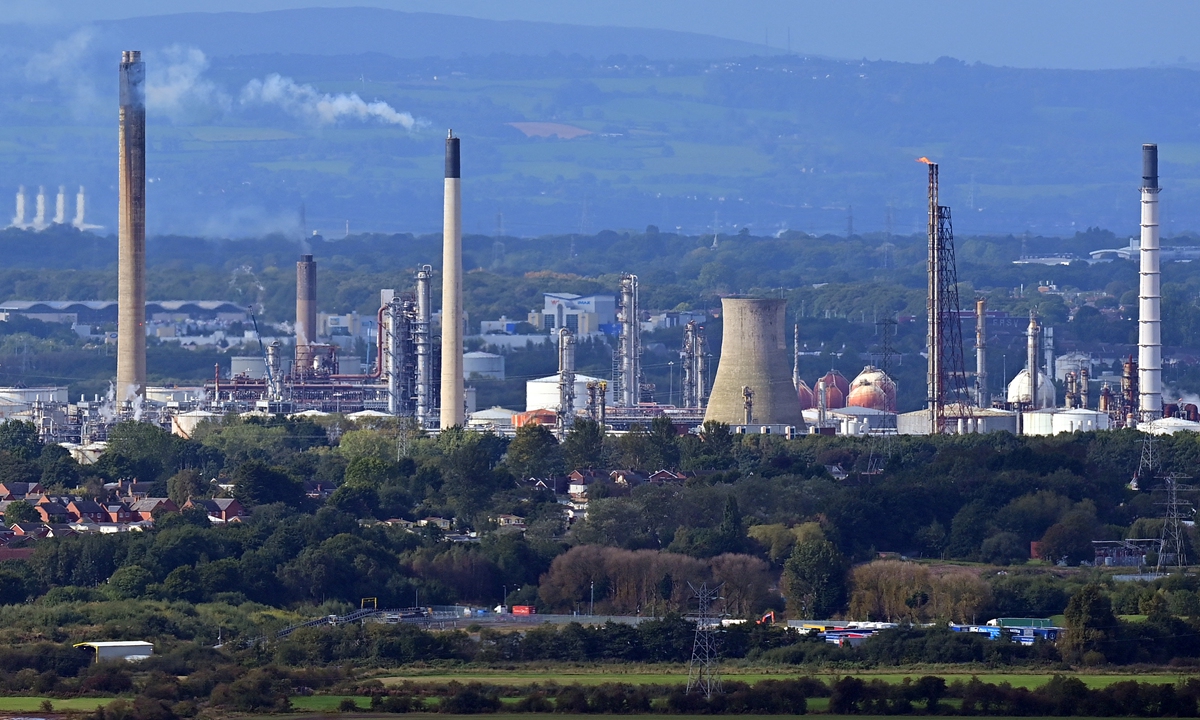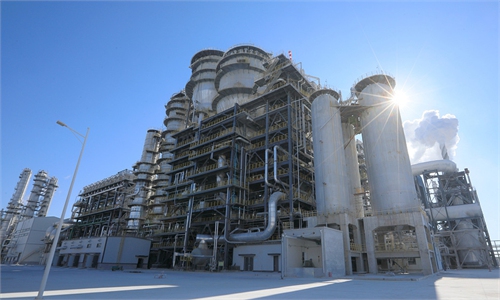
A general view of Essar Oil UK's Stanlow oil refinery near Ellesmere Port, northwest England on September 29, 2021 Photo: AFP
Click here to stay tuned with our live updates on Ukraine tensions.A possible escalation of the Ukraine conflict is likely to spur Europe's energy market into a major reset, which may pose an unprecedentedly severe test for the EU's climate change policies.
The EU leaders will agree at a summit on Thursday and Friday to phase out their dependency on imports of Russian gas, oil and coal, the Reuters reported on Monday. A draft statement showed that the EU would seek to diversify its energy supplies and routes by increasing the use of liquefied natural gas (LNG) and other alternative gases and accelerating the development of renewable energy projects.
While the West hasn't imposed sanctions on Russia's energy exports so far, there have been no shortage of media reports indicating that they are planning to do so, which may spark a risky shake-up and serious disruption of the energy market in Europe.
Historically speaking, it is not uncommon for energy markets to be buffeted by geopolitical events. But what makes the Russia-Ukraine crisis special is that Russia is one of the world's largest energy producers and exporters, which contributes as much as 40 percent of Europe's natural gas needs.
If, in extreme circumstances, the US and the EU decide to extend sanctions on ban Russia's energy exports to them, that means the EU will have to seek significant sources of alternative energy sources in order to avert a massive energy crisis, skyrocketing prices in particular.
Some may argue that the EU could step up its own development of renewable energy projects to fill the market void. However, based on the current situation when it comes to green energy development, EU countries have apparently overestimated the pace of their progress.
The energy crisis in Europe over the past several months is a vivid example of the contradiction between energy transition and energy consumption need. On the one hand, the goals of limiting greenhouse gas emissions have constrained the traditional energy sector, causing problems in the supply of fossil fuels. On the other hand, the new energy sector fails to keep pace with the energy transition when it comes to technological development and production capacity.
While some EU countries, especially Germany, have rolled out ambitious plans to phase out nuclear power plants and coal-fired plants, the development of green energy sources, such as wind, solar, or hydrogen, hasn't been even close to the level that can replace fossil fuels, which is why natural gas has become such an important energy source during the transition period. It is hard to conceive how the EU could ensure energy security if they choose to stop importing Russian supplies.
Against this backdrop, some climate change efforts could be derailed as the EU may have to readjust their plans of shuttering coal-fired power plants.
Robert Habeck, Germany's economic and climate minister, has directed moves to determine if existing coal and nuclear plants could be given a longer lease on life, according to media reports. Other EU countries are also likely to increase coal use, raising questions as to whether the growing energy crisis, exacerbated by the geopolitical event, will jeopardize climate change efforts.
The EU has been exerting pressure on China when it comes to reducing greenhouse gas emissions. China pledged to peak its carbon emissions by 2030 and become carbon-neutral by 2060. China may not adopt a radical way like the EU, but it will stick to the set targets at its own pace.
It is the West that will face the test of adhering to their climate change pledges. As an established industrial region, the EU should do more to reduce greenhouse gas emissions than other major industrial countries and regions. And if they miss the targets because of their sanctioning move against Russia, it will risk serious damage to global emissions reduction.


